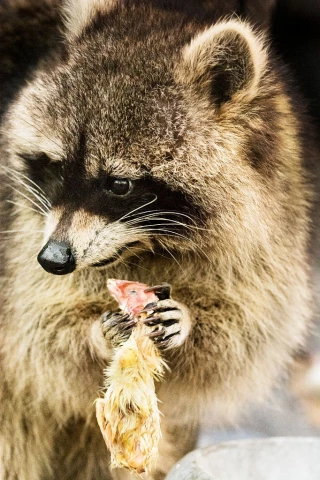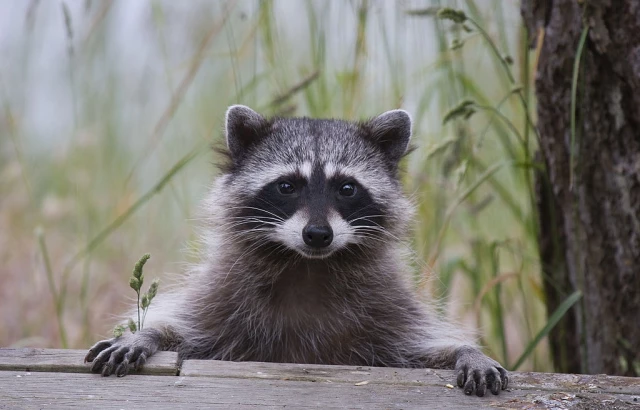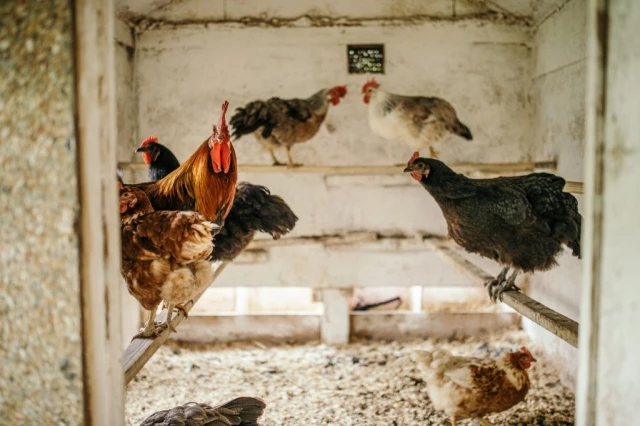Raccoons are mammals that are famous for hunting and killing. Here in this article, we see raccoons and chickens. What’s connection is found in both of them? Do raccoons eat chickens? Are you concerned that raccoons will eat your chickens? You should be if you aren’t already. While it would be wonderful to state that raccoons fear you more than you fear them, this is only partly true.
Raccoons are quickly repelled by the presence of a human, but it makes no difference how often you check the eggs in your chicken coop. A raccoon can sneak up behind you and feast on your unwary flock the moment you turn your back.
Do Raccoons Eat Chickens?
Raccoons are one of many natural predators of chickens. Chickens are small enough to fall prey to a few predatory birds and ravenous beasts. Coyotes, foxes, weasels, skunks, dogs, cats, raptors, and other animals may harass your chickens depending on where you reside.
However, raccoons can be found almost anywhere in the United States. While certain predatory risks, such as foxes and coyotes, are less widespread in cities, the raccoon is one of those opportunistic animals that will take advantage of any opportunity to eat some chicken.
Fortunately, there are a number of techniques to keep raccoons from decimating your backyard flock. These procedures are simple to implement, and as with all areas of chicken care, prevention is better than cure.
What Is the Raccoons Biology?
Raccoon Biology is a study of the biology of raccoons. You’re probably already aware of how a raccoon looks and behaves, but just in case, here’s a refresher.
Raccoons can be found as far north as Canada and as far south as Argentina, and they are native to both North and South America. They’ve also made their way to Europe and Asia, where they were first introduced.
Raccoons prefer lower elevations, avoiding high mountains and preferring to live on grasslands and coastal marshes. Males are slightly larger than females, with males weighing around fifteen pounds. Their fur is long and gray or brown-black in hue. Raccoons are distinguished by their black coloring on the front of their faces, which resembles a bandit’s mask, and their black-ringed tails.
Raccoons in The Vicinity of Chickens
You should be concerned about more than just the possibility of raccoons eating your chicks. Raccoons will also give you difficulties in other ways.
Raccoons not only enjoy eating chickens, but they also enjoy eating their eggs. If you’re having trouble with an unknown egg bandit, it could very well be a raccoon.
Raccoons are also known to carry rabies, infectious canine hepatitis, and canine distemper, among other diseases. Raccoons are critters you don’t want loitering around your house, even if most of these only impact other mammals.
Read Also: Do Raccoons Eat Other Animals?
How You Can Protect Your Chickens?
-
At night, keep your chickens indoors
It’s difficult to get off the sofa at night to walk outside and lock your chickens in the coop, especially once winter arrives and bedtime means 5 p.m. However, to keep predators at bay, you must make your chicken coop a nocturnal stronghold.
If a manual chicken door isn’t cutting it for you, or if you’re regularly away from home in the evenings and early mornings, an automatic coop door opener might be the way to go.
These doors aren’t inexpensive, but they’re timed, so you won’t have to worry about locking your chickens in at night.
-
Young Birds Should Be Watched
Raccoons attack chickens of all ages, but young cockerels and pullets are particularly vulnerable to raccoon attacks. This is because juvenile birds are more inclined to sleep on the ground at night, when raccoons may easily find them, and they lack the reflexes to defend themselves.
-
Examine Your Barriers
Raccoons can quickly climb a fence and over it. Make sure your fence is robust and keeps low-to-the-ground predators such as dogs and foxes out, and bear in mind that the fence must not only keep predators out but also keep your chickens in.
Because raccoons are such skilled climbers, it might be worth your time to build a covered run for them. Raccoons will be unable to enter the pen even if they climb to the top of the fence.
Remember that these bugs enjoy digging! Around the coop and run, consider burying hardware cloth four feet deep. This will keep them from excavating their way beneath the barrier.
Final Thoughts
An entire adult chicken is rarely eaten by raccoons. If your flock has been slaughtered and the majority of the body has been left, one of two animals is most likely to blame: a weasel or a raccoon. It’s critical to recognize the indicators of a raccoon presence in order to effectively protect your chickens.


